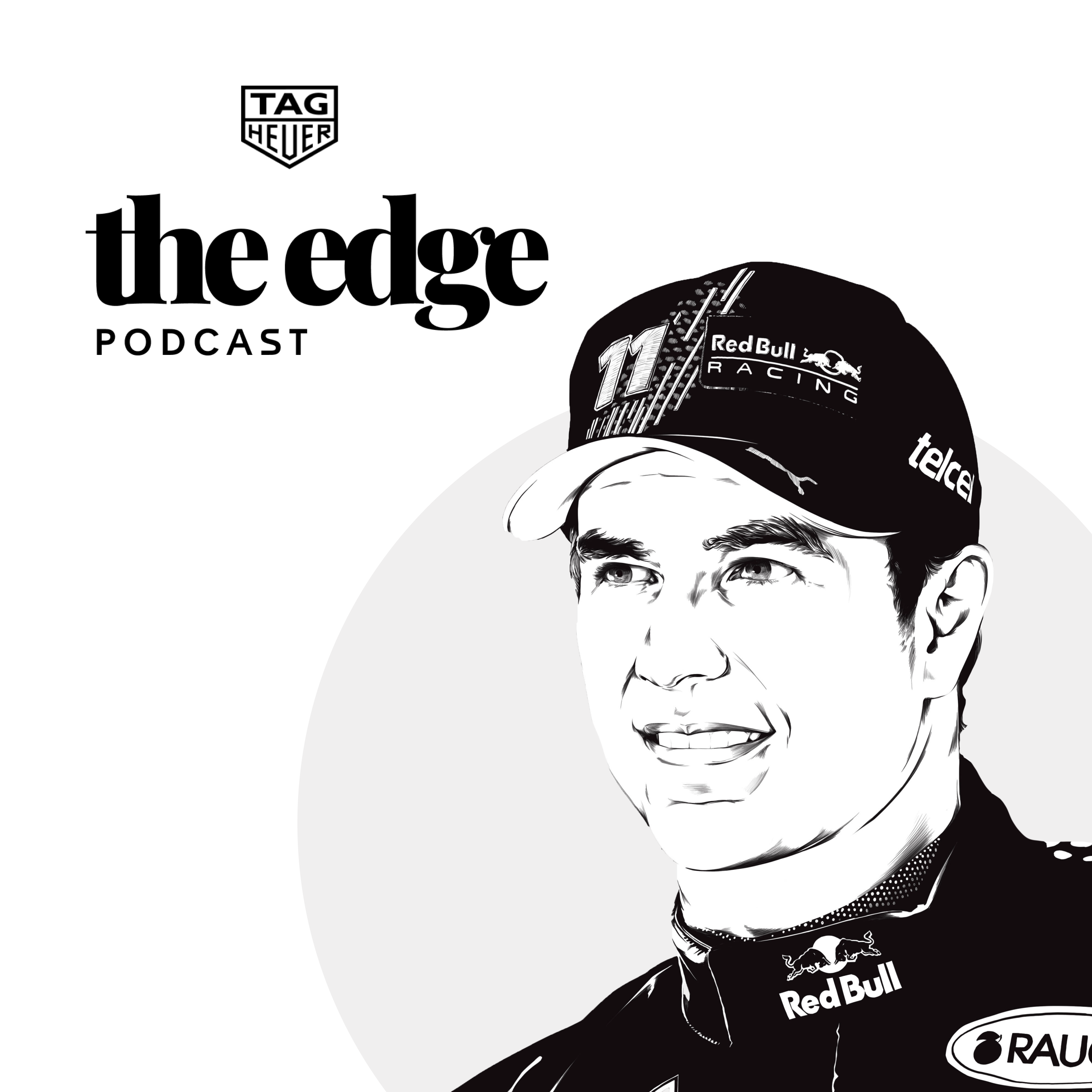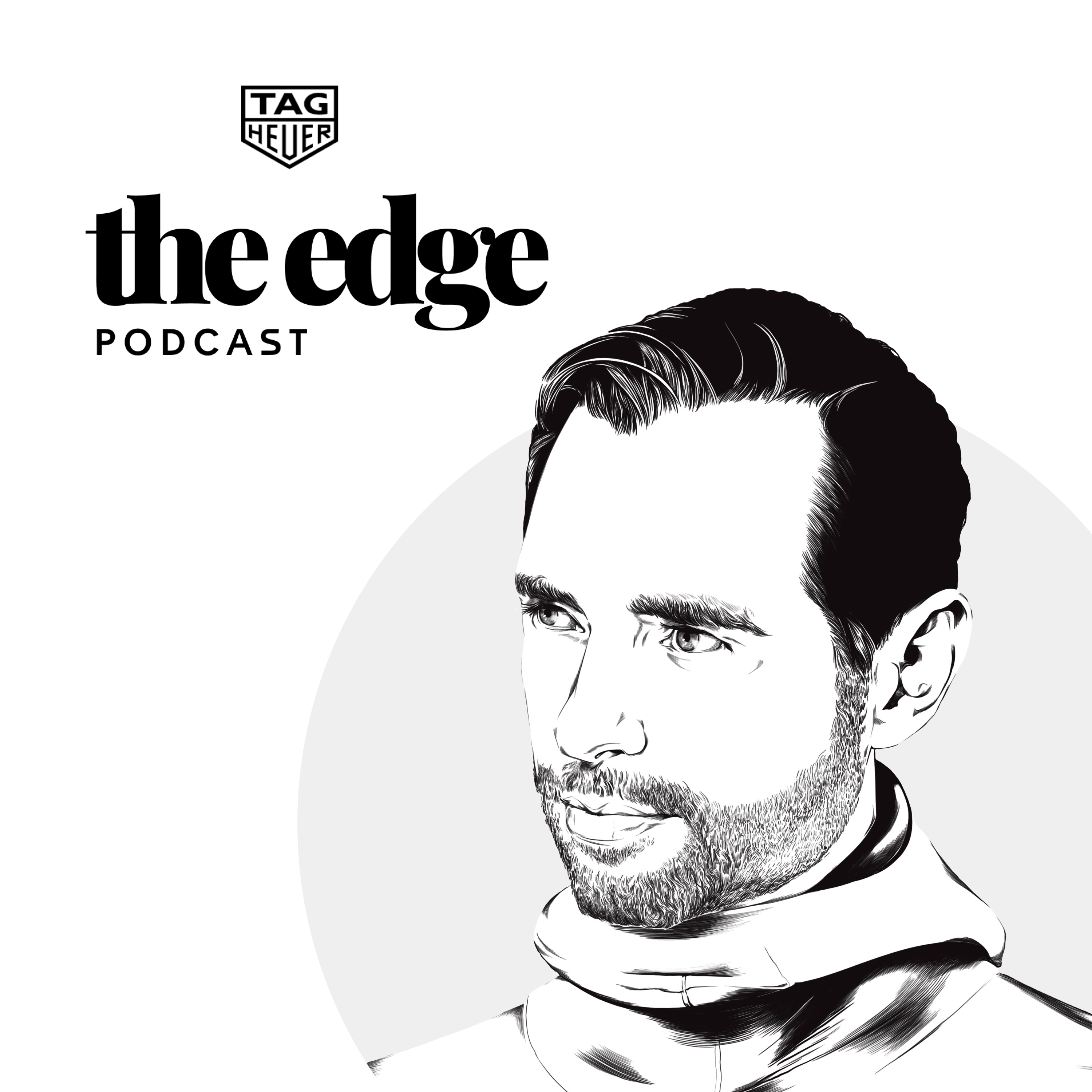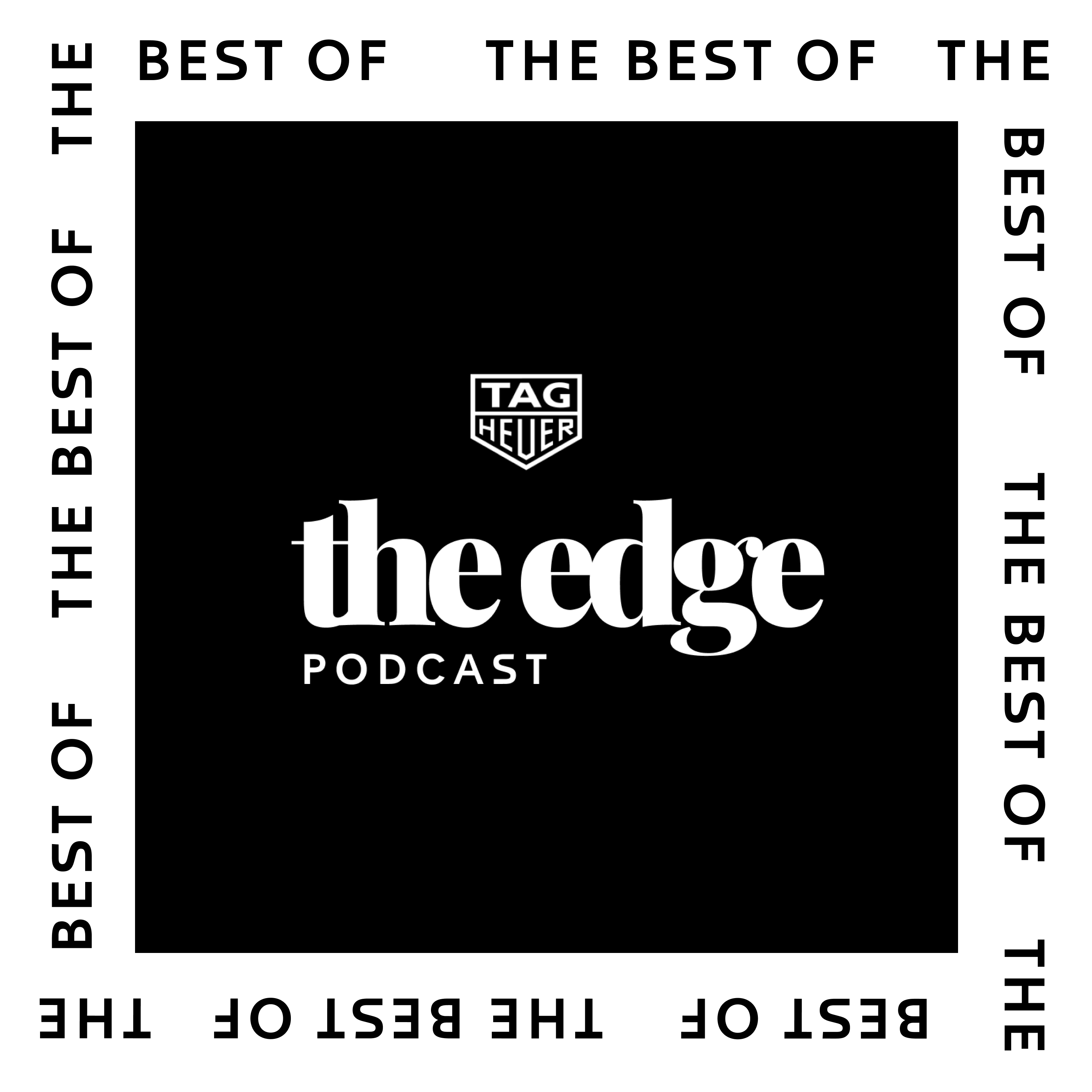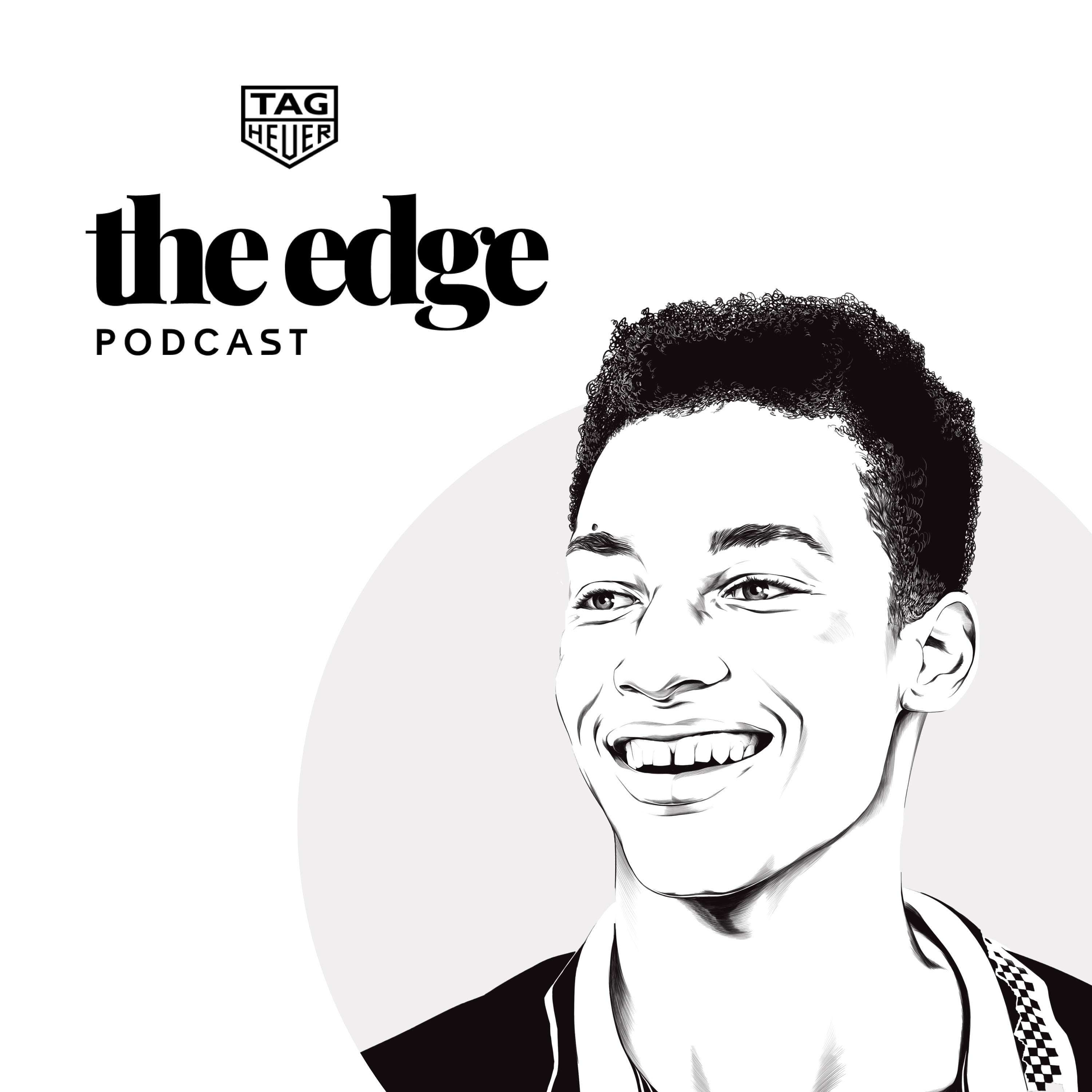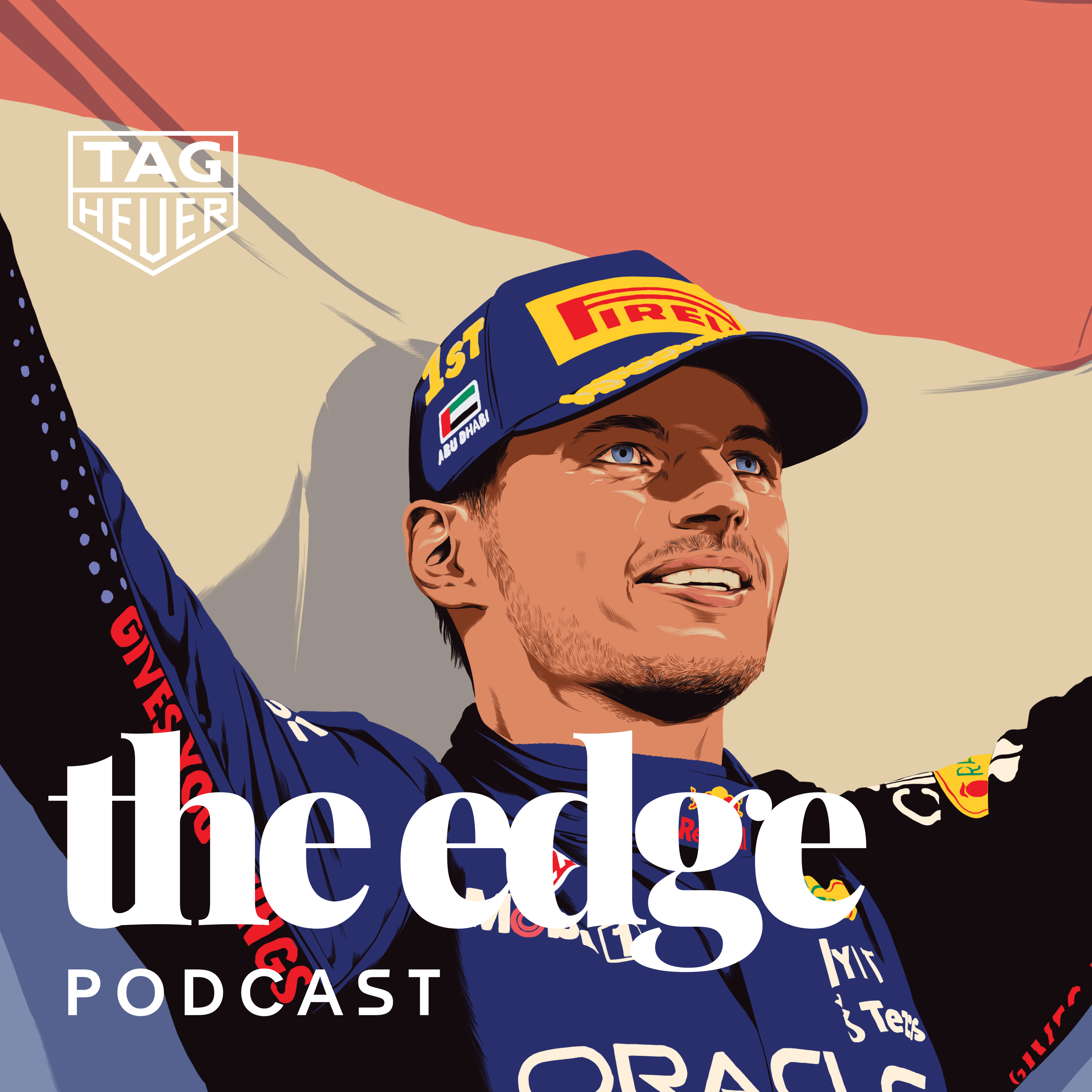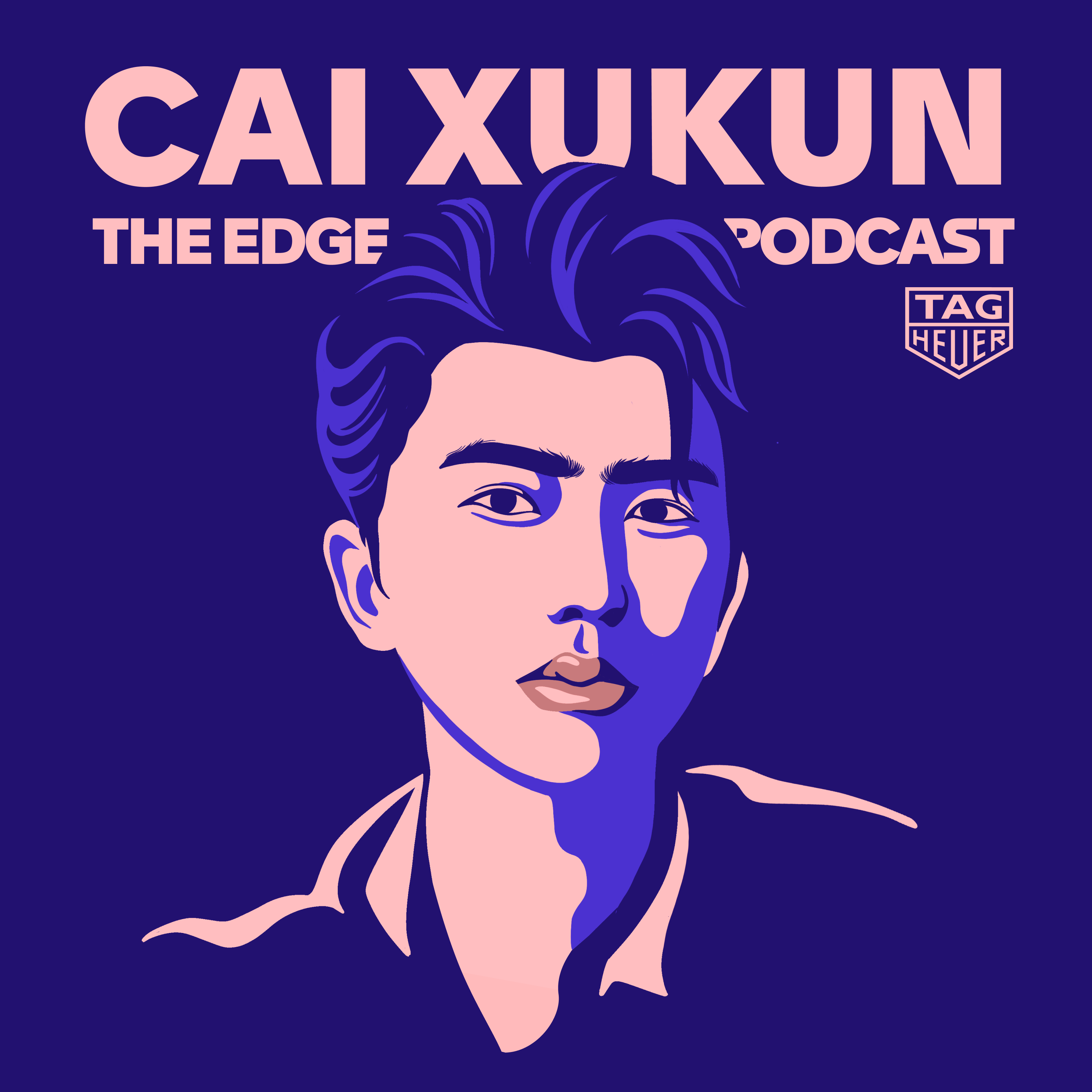Episode Transcript
Speaker 0 00:00:00 The most important thing is, is not to give up, you know, and always look ahead. There's always a new opportunity opportunity. There's always a new day and, um, you can do better tomorrow.
Speaker 2 00:00:19 Us. What gives us our edge and how do we go beyond it? How thin is the line between taking part and tipping into victory? What inspires those moments of rare advantage down to the millimeter, down to the microsecond that change the shape of a race? Is it faith, talent, focus, or sheer determination, a winners born or made, and what happens when things go wrong or when it all goes right. Welcome to the edge. We'll be talking to people operating at the very edge of possibility from athletes to actors and from artists to entrepreneurs. I'm your host te van and BRCA, and we'll be giving you the fuel. You need to get in the zone and leave your limits in the dust. Watch out. This is the edge, a podcast by tag Checko. It's wonderful to have you here at the edge. Thank you so much for joining us. So you started racing in a go-kart when you were six and your brother was also a racer. Can you tell us a little bit about how you got into it and whether there was much of a competition between the two of you?
Speaker 0 00:01:31 Yeah, well, I started my B it by, by let's say by mistake a bit, you know, I, my brother was racing and, um, I then the younger one, so I, I wanted to, to, to always follow my, my brothers steps and, um, yeah, it was pretty, pretty cool, really nice to, to look after, um, my brother in that regard, because I was always, uh, looking at his races, doing, looking at what he was doing right or wrong. And, and, uh, I think that really helped me, you know, to understand and, and think like, okay, he'st wrong. That one he's done right. This thing. And, um, I think that really helped me to, to, to have a successful career in my early, in my early days,
Speaker 2 00:02:21 Of course. And then fast forward to a few years later, of course, and you became the first Mexican driver to start an Fon race in 30 years at the 2011 Australian grand Prix. And obviously that kind of turned you into an icon in your own country. And I know you have an enormous following and there's a lot of activity around you, uh, particularly when you're back in Mexico. How, how does that feel? Um, and how do you kind of manage it? Cause it must be quite intense.
Speaker 0 00:02:47 Yeah, I really, I mean, it's part of the, of, of the, of the show. Let's say, uh, I've never dreamed with it. I never dream with being famous or having so much support or all of that. I think, um, my main dream was related to track, you know, I wanted to be very successful on track. Um, I wanted to be the best driver in the world and, uh, I am still chasing my dream, but all the rest it comes with it, you know, and it's nice. I have to say that it's really nice, you know, to go back home and, and I mean, have all the support. I'm very lucky to have that because not many drivers get to experience that amount of, of support from their countries. And so I'm very lucky and privileged to have that. Um, but it comes with a price as well. You know, like, uh, everyone knows you back home. Um, everyone knows where, where you are, what you're doing. Everyone wants to, to, to tell you how you can do better, uh, what you're doing, right. What you're doing wrong, but, but it's part of the it's part of the game. But, um, I have to say that, um, uh, at the end of the day it is a privilege and I'm a, a very lucky guy to, to have all this.
Speaker 2 00:04:10 We should probably talk about the 20, 21 season, um, yours with red bull racing. It's arguably what been one of the most intense in the past few years, how has it been from your side?
Speaker 0 00:04:23 Yeah, it's been very intense. You know, the fact that we are on my first year with red bull racing, fighting for the world constructives championship and max is fighting for the drivers. Um, it's like, I didn't have that process of adaptation. That generally is good, you know, for drivers to have, you know, when, when the car is competitive, but not winning the championship or not like able to win the championship. And I came in straight into it with no adaptation and it's been a great challenge. It's been really intense from my, from my side, a lot of things to learn. I think I've worked as hard as ever, you know, in my adaptation to the team, to, to all my engineers. So it hasn't been easy. Um, but we are working and we are giving our very best.
Speaker 2 00:05:10 Do you find that you thrive? I mean, when I speak to other formula one drivers and when I have for this podcast, there's this sense of thriving and adversity and in challenge and seeing that as the, kind of the motor behind, um, what they do, are you, are you the same as that? Do you thrive in, in adversity?
Speaker 0 00:05:28 Yeah. Um, I don't see it that way. I just, um, yeah, to go through good and bad times. And, uh, I always think that you learn more from the bad times and, um, yeah, the most important thing is, is not to give up, you know, and always look ahead. There's always a new opportu opportunity. There's always a new day and, um, you can do better tomorrow.
Speaker 2 00:05:53 Of course. I mean, one of Tao's biggest values is this of having the courage to push limits and to kind of strive for the best and never give up, um, which is obviously very fitting for racing drivers. What would you say has been the farthest you've pushed yourself in the sport and do you still have farther to go?
Speaker 0 00:06:13 Um, I think every, every time, every time there is a new challenge, every time, uh, you face a new, this is the beauty of this sport, you know, that it's not always the same. I've been in the sport for 11 years and I'm still learning new, new ways because the, the sport is constantly evolving. So you are always facing new challenges, new ways of driving new ways of communicating to your team. Um, so I think you don't stop. It's not like, uh, yeah, you have the experience and you know what to do and, and you don't have to work anymore. This sport pushes you to your absolute maximum and is not only on track of track as well, you know? Um, so it, it's why I, I love, and I enjoy so much formula one because it's always a new challenge. Uh, it never gets boring. It, it never gets old. Um, there's always a lot of, of changing, involved, a lot of, uh, things you gotta learn.
Speaker 2 00:07:16 So would you say that you, I mean, a lot of people don't enjoy change. Do you, do you enjoy change? Is that something that you kind of, um, revel in, in your life?
Speaker 0 00:07:26 Yeah. Well, I, I, I enjoy the fact that you always have to, to give you a hundred percent when you are at the sport at this level, uh, you can never like rely and, and rest. And, uh, no matter what situation you're in, either if let's say you have a long term contractor, or you don't have a drive or, um, or you've won a lot of races or, or you are the previous champion or whatsoever, you always have to perform. And, uh, you always have to go for the maximum every single weekend and try that perfection weekend after weekend. It's what I love the most, you know, trying to the, the level that we compet in it's is great because you are competing against the best, very best drivers in the world and the very best teams in the world. So there's no time to rest back.
Speaker 2 00:08:18 I mean, we should probably talk about one of your biggest recent successes, uh, which was early in November, you were made the first Mexican driver to finish on the podium in your home country, which must have been an extraordinary feeling. Um, can you describe that moment for
Speaker 0 00:08:33 Us? Yeah, that was a very nice moment for myself, for my career, you know, because I had all the people that has been with me since day won. Um, and, uh, yeah, you cannot forget the fact that, uh, at this time last year I didn't have a drive. You know, I, I would probably have to end up my career in formula one if Redwood didn't give me the opportunity. Um, and, uh, yeah, just to have all my, my fans, my, my, my crowd, my family, all the people that have been with me since day one, uh, Carlos slim, my main supporter of my career since day one gave me the trophy, you know, so it was very, very unique, very, very special moment for, for both of us. And, um, and yeah, it was, it was great, but, uh, it's not enough. I want to win my, my home grand PR one day.
Speaker 2 00:09:27 I'm sure it'll happen. Um, I, I'm really eager to kind of get inside your mind, uh, when you're preparing for a race when you're in the race and after the race, you know, as I said, this podcast is all about kind of discovering what happens at the edge when we push to our limits. So, speaking specifically when you are, when you're preparing generally before a big race, do you have a specific routine that you follow? Is there a kind of ritual, um, how do you manage your nerves?
Speaker 0 00:09:56 I'm I think I'm pretty relaxed in that, in that regard, like, because you are always different every day, um, you have something in your mind or you are going through a bad moment personally, or, or a great moment, or you have a lot of commitments to do, or you have no commitments. So, so you can, I feel like there's no point on always trying to do the same thing. I always like to, to be able to, to adapt to the situation.
Speaker 2 00:10:23 So you don't, you don't have like a lucky pair of pants or you don't eat something specific in the morning before racing <laugh> so you've done very, very well. Uh, and you particularly did well in the two or three races prior to your big win in Mexico. How do you change your strategy in some way?
Speaker 0 00:10:42 No, I think I'm just getting more adapt to the car, to the team. Um, in that regard, I think things are getting better, uh, as we speak. And, um, yeah, I'm just learning more about the car
Speaker 2 00:10:56 For the Mexican race. Um, how nervous were you before? Did you feel that pressure from the sporters or from internally?
Speaker 0 00:11:04 I mean, yeah, you, you have, let's say more, more pressure in your home country because you want to, to give the very best to them. If there is a race where you don't want to fail, it's everyone, um, try making sure that you go through lap one with no incidents, but getting in positions or having a good start. It's not easy. You know, it's not so not so easy to manage before the race, you know, everyone is looking at you, uh, shouting your name, but you have to disconnect from everything and, and you have to, to, to go into your, into your zone and, and, uh, yeah, don't let any noise destructive from what you, you gotta do.
Speaker 2 00:11:44 I, I found it really interesting doing this podcast and talking to a lot of sports people, and there seems to be this kind of general, um, adoption of mindfulness in the way that they approach what they do. And this kind of getting in the zone idea where you have to empty your mind of everything that's going on and really focus. Do you practice anything like that? Do you have anyone that helps you with anything like that, or is it just something that comes to you naturally?
Speaker 0 00:12:11 I think it's something that, that comes to you naturally and by experiencing other Mexican races, for example, you know, like you have to, at the end of the day, yeah, the people are there to cheer you and, and to support you. And no matter what result you will have, they will be there, but the most important and the best way you can make them happy, uh, is to perform at your very best. And to do that, I feel like you have to disconnect, you know, like there can be a lot of noise out there, but once you close the device or there's zero noise, or once, once you have to fully focus into it, there has to be absolutely serial. And, uh, it's not easy to reach. Um, but when, when I look back to it, I even surprise myself, you know, of how I'm, when I watch the race on TV and so on. It's like how, how was able to disconnect from all this, uh, support from all these, uh, people cheering me? Uh, it wasn't, it wasn't an easy one.
Speaker 2 00:13:13 And you watch yourself back after every race. Is that right?
Speaker 0 00:13:18 No, not really. <laugh> no, only the race I do. Well, I, I watch when I do bath. Um, yeah, I don't, I don't like watching them. Um, <laugh> yeah. I just learn from it and move on.
Speaker 2 00:13:34 Um, one of the things that, again, a lot of sports people say is they have to switch off from social media because, you know, again, that, that noise can be very distracting, particularly in a lead up to an event or a race. Is that something that you, you do too?
Speaker 0 00:13:49 Yeah. Yeah. I think social media, um, has become too much, um, in the last couple of years, you know? Um, not, I, and I don't think just for sportsman, even for, for normal people, um, I mean the amount of time that we spent on it, um, during a day, it's just, I think, unacceptable. Um, so I'm, I'm not a big fan of it. I, I have to say that, um, I think it's a great tool as a Sportman, you know, to, to engage with your fans, um, with your brands, but, but it has to be a limit and a balance. Um, so, so, yeah. Um, I think it's important to, to make sure you control the amount of time, uh, as, and as well, not just as a Sportman, as a human being to, to make sure you, you control the time you dedicate and, and try to, to minimize it.
Speaker 2 00:14:47 Yeah. It's good advice for everyone. I would say, um, we should talk a little bit more about the race in Mexico. Um, you were in a great position, number four for this race. Um, what are you thinking at that moment before you, before you go, or are you, is your mind blank or are you thinking about certain bends? What, what what's, what's going through your brain?
Speaker 0 00:15:09 I'm thinking to try to, to have the best possible start. I possibly can. The best reaction to the lights and the best positioning to turn one, you know, to make sure I'm able to overtake. Mm, yeah. That's what I'm thinking at the time, but, um, it can go right. It can go wrong. Um, but that's my, my thinking, you know, and then I, I focused after I go, I've gone through turn one, then I start to think about the, the race space, because it can, all of the sudden change what's, what's happening in your race on lab one.
Speaker 2 00:15:41 Mm. I mean, are there, are there must have been key moments in that race, which you can now look back on and think that's why I managed to make it onto the podium. Are there, are there any that you can share with us?
Speaker 0 00:15:55 Well, I think the main one was to get P two from Louis was to, to do the undercut. There was a very critical lap that, uh, I think if, if, if me didn't react to it, we will have react and got P two, which will have been great, you know, for, for our team. Um, but, um, yeah, not, I think in general it was a good start. Uh, we had a good one and, uh, and that just had to, to make the progress and have a good, a, a good race. But, um, yeah, I think PTU was so close that, um, I have, I mean, we haven't had that one to this season, uh, and to have that one in my country would have been great.
Speaker 2 00:16:40 <laugh> um, I mean, obviously, you know, you are the person out there on the track doing what you do, but, you know, as we, as we all know, formula one is a real team sport. Um, during that race, we could hear Lewis, Hamilton complaining about not being able to detach himself from you and complaining about his team. How would you describe the teamwork that went into your success in that race?
Speaker 0 00:17:05 Uh, well, my team is, is a big part of, of, of the result, what we do on track of track, the, the preparations leading up to the races. It's a lot of work that we do, and a lot of preparation that we are doing, um, together. So yeah, we are a team at the end of the day. Um, everyone is very important. Everyone's job. It's here to our success.
Speaker 2 00:17:33 Mm. I mean, I I'm intrigued to know once you finish the race. I mean, what is the feeling? Is it an enormous sense of relief? Do you feel your body kind of letting go of the tension? Um, are you kind of flooded with endorphins or are you stressed about kind of where you've come and what you've done? What's the, what's the general feeling that you have at the end of a race, and, but specifically that race
Speaker 0 00:17:58 <laugh>, it really depends on the race. It depends. It course, uh, on that race. Yeah. It's, it's about like the, the lead up into it is so intense, you know, I think we start from since Tuesday, so it gets very intense, a lot of commitments, a lot of, of, of noise behind you, but once I'm, I'm able to finish the weekend, um, it's just like a relief, you know, like, oh, okay. This one is done. Let's go on to the next one. Um, so yeah, that can be a bit of a relief, but, um, if not, if it's a bad result, then it's like, oh my goodness. Um, it's okay. I just have to move on <laugh> I'm racing next weekend. So, um, yeah, but especially Mexico, I think it's a, a big relief, like, like I'm able to breathe differently once, uh, once I cross the finish line.
Speaker 2 00:18:53 And does that mean that you are constantly tightly wound throughout the entire season? I mean, given that you are racing so much and that you are kind of having to prep for new tracks constantly, um, are you, are you, do you find that you are constantly in a kind of state of preparedness?
Speaker 0 00:19:10 Yeah, we are constantly preparing, um, as I say, the season is so intense that, I mean, we are, we are playing a world cup every weekend, pretty much every 15 days or so. So we, every, every race is so important, so critical that we, we want to perform at our best, not just as a driver, as a team. And, um, yeah, that's something that we, we really pushing hard to, to do.
Speaker 2 00:19:38 I'm intrigued to know how, um, the celebrations went after your Mexican race. Uh, did you manage to celebrate, or did you kind of, kind of have to keep a lid on it?
Speaker 0 00:19:47 Uh, the, the, the main thing is that we're still on COVID days, so it wasn't so easy to, to, to party and so on with all, all the people. But, um, yeah, I managed to have a couple of drinks, um, during that night because, uh, we were actually racing in, in Sao, um, the weekend after. So, um, yeah, couldn't, let's say couldn't have a big hangover. So, uh, yeah, we, we had to, to fly the couple, couple of days after the race into Sao, so it was like, okay, it happened, but we, we are looking into the next race
Speaker 2 00:20:25 Of course. Um, so that obviously must have been a real highlight for the season thus far. Can you share any other highlights that have really stuck out for you?
Speaker 0 00:20:35 Um, well obviously winning for the first time with my team, uh, with red bull, um, getting that first victory was very nice, um, in, in Baku at my sixth race with the team. That was nice. Um, and obviously my podium at, at my home grand Prix. Um, but the main one, I really hope I'm, I'm able to bring the constructor cycle to, to the team.
Speaker 2 00:21:00 I mean, you've extended your contract with rebel racing. What is it that has made you want to stay and did you expect to want to stay?
Speaker 0 00:21:09 Um, I really enjoy working with the team to be honest, uh, with the, with a group of people, with the engineers, with the red bull culture, with, um, with the brand itself, you know, red bull, it's a huge brand and yeah, it is a lot of work, you know, relative to, to what I, what I used to in other teams. Um, Redwood is a massive brand and, but I, I enjoy, uh, you know, I, I really feel great part of it. I'm working great with max, with the race engineers, with, um, all the team in general. And yeah, I, I I'm, I think to me at this stage, I am in my career. Uh, the most important is I enjoy it. Um, the time that I don't enjoy it's the time I have to go home, you know, because, uh, I don't need anymore to be here. You know, I, I I'm here because I'm fully believe that I can be a world champion. And because I enjoy working with, with my team, that's, uh, that's it. And, and, um, I'm very thankful to rebel to extending my contract.
Speaker 2 00:22:13 Um, I'm intrigued. I mean, for, for those who may not know you, you are saying that at re bull racing, it's, it's a lot more work than being in other teams. Can you touch on, on why and, and exactly what that kind of work entails?
Speaker 0 00:22:27 Well, first of all, the, the brand red bull red bull brand is it's, you know, you have a lot of commitments, we have a lot of partners. Um, so therefore it keeps you busy as a driver, but also on the, on the track side, you, you are, you you're normally fighting for the world championship. Uh, if not, you're trying to, so off track on track, it's a lot of work. It's a lot of demand. You are on the spotlight all the time, so that that's make, it makes it very, very intense. Um, compared to, to a team that let's say is not fighting for the world championship or does is not a big as a big brand as, um, red police. So yeah, that, that makes it more, more challenging.
Speaker 2 00:23:15 Yeah, of course. I, away from the track, you I've heard that you have said that you would be a lawyer, if you weren't a formula one racing driver. I can't really figure out the connection between the two. What, what do you think it is that you, that, um, that kind of would want to be a lawyer?
Speaker 0 00:23:34 Uh, well, lawyer or a banker, you know, I think, okay. It shares a bit the, the adrenaline that we, we live every day into, into, into our lives. Um, I quite like adrenaline and, uh, I think, I mean, those jobs really gives you that adrenaline. Um, certainly, but, um, but yeah, um, something related to sport, I I'll say as well, you know, um, probably a lawyer that helps the sportsmen getting down their contracts or kind of a manager, um, I don't know, something, something I, I really like the life that is related to sport, you know, living with that thinking how you can do better, how you can be better. And that's something I really like.
Speaker 2 00:24:22 Um, your family is obviously a very big part of your life and they often attend the races. Would you like to see your children following in your footsteps, given that you started when you were six? I mean, <laugh>, it's something that could happen.
Speaker 0 00:24:36 I mean, it's a, it's a tough, tough career. I have to say. I mean, I, I guess every career to make it onto the top, you know, to, to get into the highest level of your sport, it, it takes a lot from you. Um, but I think if my kids are willing to, to do it and they they're willing to, to give it all and, and to beful to be very professional, uh, at a very young age, I'm more than happy to support them. You know, I think as a that, um, I had all the support from my, from my parents. So I'll do the same for my kids. It doesn't matter for me if they want to be a formula one driver or, or if they want to be a lawyer, uh, I will support them in whatever they want to do, but I will push them to be their best, you know, to, to make sure they give their best.
Speaker 0 00:25:28 I mean, if they, if they don't have the, the talent to, to be the best, at least they have to, to make sure they, they give it all. Uh, and that for me is the most important, you know, sometimes you don't have the talent to, to make it and, uh, and it can get very frustrating. But for me, the most important is I give the role in whatever they want to do. Um, competition is very high these days, so, um, I want to teach my, my kids to, to give it all in, in whatever they do, you know, to, to make sure they they're passionate about what they're they want to do.
Speaker 2 00:26:04 Fabulous. Well, I have two more questions before we finish the first, uh, looking ahead, uh, checkout, what are your kind of biggest goals, I guess, for the rest of the season, but also for 2022?
Speaker 0 00:26:17 Well, for the rest of the season, I want to bring the constructive cycle home. Um, and for next season, I want to be in the fight for the world championship myself. Uh, we, we start with a new rules with new cars. We all let's start from zero. So that's the main, the main thing for me to try to get there.
Speaker 2 00:26:37 And finally, uh, looking at six year old, Checo starting in go-kart what would you say to him now? What advice would you give him?
Speaker 0 00:26:49 I will just tell him, you know, to enjoy, enjoy the ride. Um, don't worry so much about every single bad race, every single bad moment, just enjoy, learn from them and make sure you are always happy. Um, that will be my biggest, my biggest, um, advice to, to the young Checko and also, uh, to never give up,
Speaker 2 00:27:16 Of course, fabulous. Um, checkout, thank you so much for taking the time to speak to us and good luck for the rest of the season. Uh, it's been brilliant having you at the edge.
Speaker 0 00:27:25 Thank you very much for the invitation.
Speaker 2 00:27:27 Thanks so much. Thank you for joining us at the edge. A podcast by tag Hoyer. Don't forget to subscribe on Spotify, iTunes or wherever you get your podcasts. The edge is also an online magazine. Go to magazine dot tag, hoya.com for more articles, interviews, and photo series that bring together our love of watches and our desire to push ourselves to the edge of our limits. I'm your host, Teo van and BRCA until next time, keep an eye out. This is the edge.
